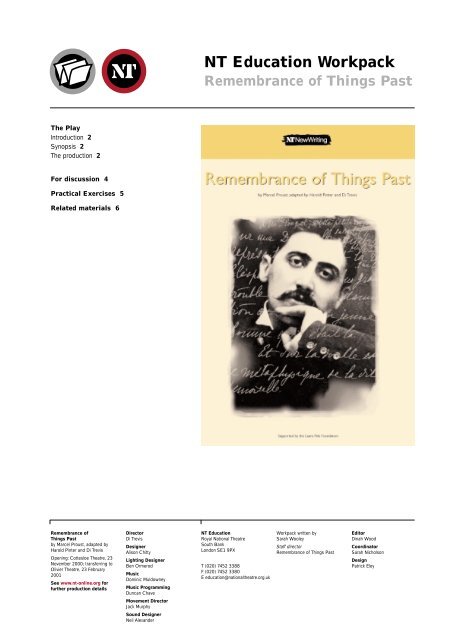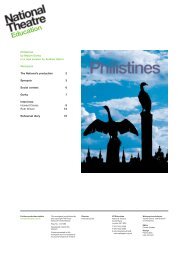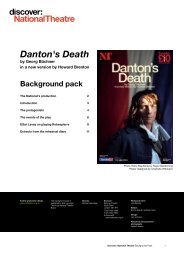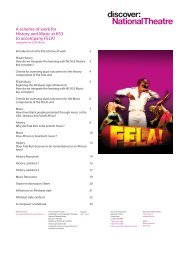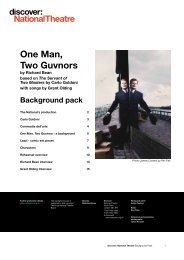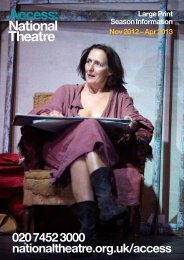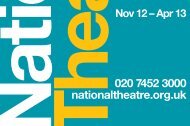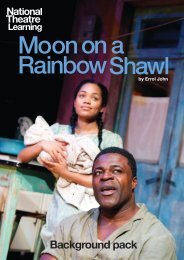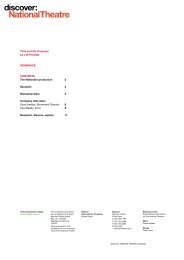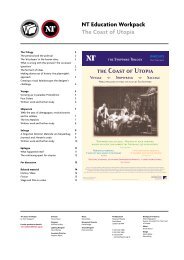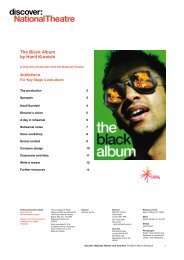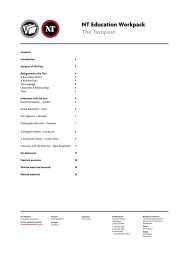Remembrance of Things Past - National Theatre
Remembrance of Things Past - National Theatre
Remembrance of Things Past - National Theatre
You also want an ePaper? Increase the reach of your titles
YUMPU automatically turns print PDFs into web optimized ePapers that Google loves.
The Play<br />
Introduction 2<br />
Synopsis 2<br />
The production 2<br />
For discussion 4<br />
Practical Exercises 5<br />
Related materials 6<br />
<strong>Remembrance</strong> <strong>of</strong><br />
<strong>Things</strong> <strong>Past</strong><br />
by Marcel Proust, adapted by<br />
Harold Pinter and Di Trevis<br />
Opening: Cottesloe <strong>Theatre</strong>, 23<br />
November 2000; transferring to<br />
Olivier <strong>Theatre</strong>, 23 February<br />
2001<br />
See www.nt-online.org for<br />
further production details<br />
Director<br />
Di Trevis<br />
Designer<br />
Alison Chitty<br />
Lighting Designer<br />
Ben Ormerod<br />
Music<br />
Dominic Muldowney<br />
Music Programming<br />
Duncan Chave<br />
Movement Director<br />
Jack Murphy<br />
Sound Designer<br />
Neil Alexander<br />
NT Education Workpack<br />
<strong>Remembrance</strong> <strong>of</strong> <strong>Things</strong> <strong>Past</strong><br />
NT Education<br />
Royal <strong>National</strong> <strong>Theatre</strong><br />
South Bank<br />
London SE1 9PX<br />
T (020) 7452 3388<br />
F (020) 7452 3380<br />
E education@nationaltheatre.org.uk<br />
Workpack written by<br />
Sarah Wooley<br />
Staff director<br />
<strong>Remembrance</strong> <strong>of</strong> <strong>Things</strong> <strong>Past</strong><br />
Editor<br />
Dinah Wood<br />
Coordinator<br />
Sarah Nicholson<br />
Design<br />
Patrick Eley
Sebastian Harcombe &<br />
Judy Campbell<br />
photo Catherine Ashmore<br />
The play<br />
Introduction<br />
<strong>Remembrance</strong> <strong>of</strong> <strong>Things</strong> <strong>Past</strong> is an adaptation <strong>of</strong><br />
the seven novels by Marcel Proust known<br />
collectively as A la recherche du temps perdu.<br />
Harold Pinter and Di Trevis adapted the play from<br />
a screenplay that Pinter was commissioned to<br />
write in 1972. The film was never made.<br />
However, Di Trevis rediscovered the screenplay<br />
and began to workshop it into a stageplay with<br />
students from the London Academy <strong>of</strong> Music and<br />
Dramatic Art (LAMDA) in 1998. The students<br />
performed their version <strong>of</strong> <strong>Remembrance</strong> <strong>of</strong><br />
<strong>Things</strong> <strong>Past</strong> in a rehearsal room at the <strong>National</strong><br />
<strong>Theatre</strong> where it was seen by Trevor Nunn. He<br />
suggested that Di Trevis should stage the play in<br />
the Cottesloe <strong>Theatre</strong> with the 2000 Ensemble.<br />
Synopsis<br />
<strong>Remembrance</strong> <strong>of</strong> <strong>Things</strong> <strong>Past</strong> is a journey back<br />
in time through the eyes <strong>of</strong> Marcel, played at the<br />
<strong>National</strong> by the actor Sebastian Harcombe. At<br />
the beginning <strong>of</strong> the play Marcel is walking to the<br />
Guermantes’ reception, he slips and falls in the<br />
snow. The sensation <strong>of</strong> falling reminds him <strong>of</strong> the<br />
time when he tripped on two uneven paving<br />
stones in the Baptistery <strong>of</strong> St. Marks. As Marcel<br />
arrives at the reception more memories come<br />
flooding back. He hears the sound <strong>of</strong> a waiter<br />
dropping a spoon on a plate which triggers <strong>of</strong>f<br />
another memory <strong>of</strong> a line <strong>of</strong> trees seen from a<br />
railway carriage. At the reception Marcel meets<br />
many faces from the past but everyone is so old<br />
that they are almost unrecognisable. It is here<br />
that we are introduced to the many characters<br />
that we will see in flashback throughout the play.<br />
But it is Odette played by Fritha Goodey who<br />
first takes us physically far back in time. When<br />
talking to Marcel she recalls her first husband<br />
Charles Swann (played by Duncan Bell). Swann<br />
appears, Odette is transformed into her younger<br />
self and Marcel’s memories begin to unfold as he<br />
remembers his childhood at Combrey, his<br />
holidays in Balbec, his days in Paris and all the<br />
important people who shaped and informed his<br />
life.<br />
The Production<br />
A phrase that I heard Di Trevis use many times<br />
during rehearsals was, “We are not doing the<br />
novels, we are not doing the screenplay, we are<br />
doing the play”. This production had to be a<br />
theatrical event. Yet if we look at the play we see<br />
moments that appear to have their roots in film.<br />
For example the freeze frame technique used<br />
when both the Vinteuil piano pieces are played<br />
for the first time and the flashbacks that appear<br />
as images during the play. These moments give<br />
the play a very unique quality, making the<br />
production hard to categorise. We had to create<br />
a Proust dreamscape.<br />
From the first day <strong>of</strong> rehearsals it was<br />
important that the actors were familiar with the<br />
manners and movement <strong>of</strong> the period. All the<br />
actors wore bits <strong>of</strong> costume in the rehearsal<br />
room. People used to wearing jeans and trainers<br />
every day were able to spend time wearing long<br />
skirts and leather dress shoes. Jack Murphy, the<br />
movement director, worked on waltzing,<br />
reverencing and status for many weeks, right up<br />
until the play’s opening night. It was important<br />
national theatre education workpack 2
Sebastian Harcombe<br />
photo Catherine Ashmore<br />
The play<br />
that this new way <strong>of</strong> moving became second<br />
nature to the actors.<br />
Di Trevis is a Director who uses many<br />
exercises as part <strong>of</strong> her rehearsal process. For<br />
example in the Balbec scenes we see the little<br />
band <strong>of</strong> girls. They play in the sea, fool about in<br />
the restaurant, jump over the old man and have a<br />
picnic. During rehearsals we spent a long time<br />
improvising these situations before we even<br />
looked at the text. The actors even went right out<br />
<strong>of</strong> the building and down to the Thames on one<br />
occasion dragging their bike, picnic baskets and<br />
equipment with them.<br />
Di Trevis also likes the actors to improvise the<br />
scenes that we don’t see but have a bearing on<br />
the scenes that we do see. For example if we<br />
look at the scene where Marcel’s father<br />
introduces Marcel to the Marquis De Norpois.<br />
Norpois is a very pompous man who thinks that<br />
he is the authority on writing as a career. Paul<br />
Ritter (Marcel’s father) and John Burgess<br />
(Norpois) improvised a scene where Marcel’s<br />
father asks Norpois to visit the house to give<br />
Marcel advice about writing. The improvisation<br />
took place in an imagined gentlemen’s club<br />
where the two characters felt comfortable<br />
smoking cigars and drinking brandy. The two men<br />
talked about many things until Marcel’s father<br />
tentatively raised the question <strong>of</strong> Marcel’s writing.<br />
We could see from this improvisation that it was<br />
awkward for him to ask Norpois for help, as he<br />
believed him to be a very important figure. We<br />
then played the scene that was written and the<br />
tension for both Marcel and his father was very<br />
evident. There was a lot at stake both for Marcel<br />
and for his father.<br />
national theatre education workpack 3
Duncan Bell & Fritha Goodey<br />
photo Catherine Ashmore<br />
For discussion<br />
If you’ve seen the production<br />
1<br />
Music<br />
Dominic Muldowney wrote the music for<br />
<strong>Remembrance</strong> <strong>of</strong> <strong>Things</strong> <strong>Past</strong>. During rehearsals<br />
Di Trevis said that the music is like another<br />
character in the play. Do you agree? What was<br />
the role <strong>of</strong> the music in this production and how<br />
did it inform the play?<br />
2<br />
Design<br />
Describe the set for <strong>Remembrance</strong> <strong>of</strong> <strong>Things</strong><br />
<strong>Past</strong>. How did the designer achieve the many<br />
different locations in the play? How important a<br />
role did costume play in this production?<br />
3<br />
Movement<br />
The Movement Director for <strong>Remembrance</strong> <strong>of</strong><br />
<strong>Things</strong> <strong>Past</strong> was Jack Murphy. Where do you<br />
think movement occurred in the production? If<br />
you were the Movement Director on<br />
<strong>Remembrance</strong> <strong>of</strong> <strong>Things</strong> <strong>Past</strong> what would be<br />
your starting point?<br />
And even if you haven’t<br />
1<br />
Adaptation<br />
What problems do you think you might encounter<br />
when adapting a novel into a play? Can you<br />
suggest ways in which you could overcome these<br />
problems?<br />
2<br />
Design<br />
The action in <strong>Remembrance</strong> <strong>of</strong> <strong>Things</strong> <strong>Past</strong> takes<br />
place in many different locations. If you were the<br />
Designer how would you approach a play like<br />
<strong>Remembrance</strong> <strong>of</strong> <strong>Things</strong> <strong>Past</strong>?<br />
3<br />
Inspiration<br />
Characters in the play describe Marcel as a<br />
writer. However, throughout the play Marcel<br />
always denies this. What finally makes Marcel<br />
want to write? What are his inspirations?<br />
4<br />
View <strong>of</strong> Delt<br />
Discuss the significance <strong>of</strong> the Vermeer painting<br />
‘View Of Delt’.<br />
national theatre education workpack 4
Indira Varma &<br />
Sebastian Harcombe<br />
photo Catherine Ashmore<br />
Practical Exercises<br />
1<br />
Look at the scene between Norpois, Marcel’s<br />
father and Marcel. Read the scene. The actor<br />
playing Marcel should now write the Steeples<br />
poem. Play the scene again this time using the<br />
newly written prose poem. How does this affect<br />
the scene?<br />
2<br />
Look at photographs or paintings from Proust’s<br />
time. Split into groups and, choosing a picture,<br />
re-create a three-dimensional version <strong>of</strong> the<br />
scene. Perhaps if you have any old bits <strong>of</strong><br />
costume you could use them here. Once the<br />
picture is in place improvise the scene. Then after<br />
a few minutes freeze-frame the action back into a<br />
picture. How different is the scene from a<br />
modern setting? Do the costumes have any<br />
bearing on the way your character behaved?<br />
3<br />
Look at the Backstage scene. There may only be<br />
four characters speaking but the scene is very<br />
busy and populated with people. Imagine you are<br />
the Director <strong>of</strong> <strong>Remembrance</strong> <strong>of</strong> <strong>Things</strong> <strong>Past</strong>.<br />
Who would you include in your Backstage<br />
scene? Cast the characters then improvise. Who<br />
are the other characters in the Backstage scene?<br />
How old are they? What do they look like? What<br />
are they doing backstage and how did they end<br />
up there?<br />
4<br />
Francoise tells the little Marcel that M. Swann is<br />
“an intimate acquaintance <strong>of</strong> the President <strong>of</strong> the<br />
Republic himself”. That his Coachman says he<br />
“dines with Princesses.” Improvise the scene<br />
between the Coachman and Francoise gossiping.<br />
What does this tell us about Francoise and her<br />
role in the household?<br />
national theatre education workpack 5
Oliver Williams &<br />
members <strong>of</strong> the company<br />
photo Catherine Ashmore<br />
Related Materials<br />
Marcel Proust: <strong>Remembrance</strong> <strong>of</strong> <strong>Things</strong> <strong>Past</strong><br />
A series <strong>of</strong> seven novels published by Penguin<br />
Classics translated by C.K. Scott Moncrieff<br />
Harold Pinter: The Proust Screenplay<br />
Appears in a collection together with other<br />
Screenplays by Pinter. Published by Faber and<br />
Faber<br />
Harold Pinter: Plays 1–4<br />
These collections include Pinter’s best known<br />
plays. Published by Faber and Faber<br />
Time Regained<br />
A film by Raul Ruiz (2000)<br />
The <strong>National</strong> is publishing a rehearsal diary <strong>of</strong><br />
<strong>Remembrance</strong> <strong>of</strong> <strong>Things</strong> <strong>Past</strong> by Di Trevis. For<br />
further details please contact the <strong>National</strong>'s<br />
bookshop on:<br />
T 020 7452 3456<br />
F 020 7452 3457<br />
E bookshop@nationaltheatre.org.uk<br />
national theatre education workpack 6


